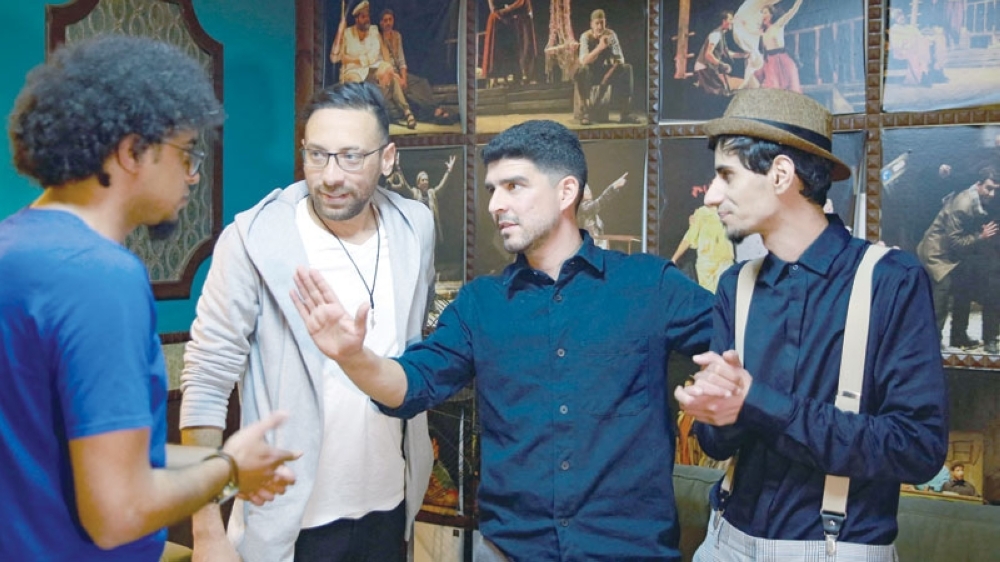

When life gave them lemons, two Jordanians launched a club to train people in the art of comedy in a country where years of economic woes have left little to laugh about.
Since being founded in 2019, the Amman Comedy Club (ACC) has been training aspiring comics, offering free, three- to four-month workshops in stand-up, improv, comedy sketches and satire writing. Aided by foreign institutions such as the Konrad Adenauer Foundation, and with the help of Chicago-based comedy club The Second City, the club has already trained more than 140 people.
The new comedians hoping to put a smile on Jordanian faces range in age between 18 to 40 and include students, doctors and lawyers among others, keen to learn the art of comic timing and delivery.
“Comedy is a message, and our message is to make people laugh,” said Moeen Masoud, one of the club’s co-founders.
“If you come to this place and spend two hours laughing and forget about your problems and worries, this means I have fulfilled my message.”
It is part of the founders’ broader social mission.
“In our daily lives, we face a lot of economic, social and psychological pressures, and the best way to relieve these worries is to laugh,” the other co-founder Yazan Abu al-Rous added.
Jordan’s deep economic difficulties were exacerbated by the Covid-19 pandemic. According to official figures, unemployment rose in 2021 to about 25 per cent — and up to 50 per cent among young people.
With public debt exceeding $47 billion, or more than 106 per cent of gross domestic product, the poverty rate also increased to an unprecedented 24 per cent that year.
- Social critique -
Shining a light on social issues through comedy could also help the country as societies need criticism “in order to grow and be able to fix their defects,” added Abu al-Rous.
Masoud lamented that “comedy did not get what the attention it deserves in Jordan.”
“We have great ambitions, beyond Jordan. We aspire to have a tour in the Arab world and the wider world for Jordanian comedians and hope to train many people around the world.”
The duo has also spearheaded efforts to dispel one lingering notion about their compatriots.
“There is a stereotype that Jordanians do not laugh,” said Abu al-Rous, who has a master’s degree in business administration.
“We at ACC wanted to challenge this idea and prove the opposite to the world, that we love laughter and jokes.”
So far, the club graduates have performed shows across Jordan and are also training students at private schools in stand-up comedy. The club also runs psychological support courses for children in areas that host Syrian refugees.
- ‘Forget worries’ -
Among the club’s graduates are now well-known comedians, who have amassed hundreds of thousands of followers on social media and perform weekly shows in Amman.
Graduate Abdullah Sobeih, 25, said his training taught him “how to choose topics that affect people’s lives, how a comic story is built”.
With over 340,000 followers on Instagram, the business graduate hopes his new career can help fellow Jordanians “make them forget their worries”.
“We know that people suffer from problems and pressures... we are trying to bring them to this place in order to offer some relief,” Sobeih said.
He is among four of the club’s better-known alumni, alongside Kamal Sailos, Abdulrahman Mamdouh, and Yusef Bataineh, who are slowly establishing themselves as household names in Jordan.
In the 350-seat Al-Shams Theatre, the trio perform separate stand-ups to an audience of mostly young men and women.
“Our country is the only country in the world that when you google its name the results would show Michael Jordan,” said Yusef Bataineh to roars of laughter at the comparison of the Hashemite kingdom with the legendary US basketball player.
After the show, university student Ahmed said the tough daily grind can mean “people really lose the value and importance of laughter”.
“What they do here is give people positive energy that they desperately need,” he added. — AFP
Oman Observer is now on the WhatsApp channel. Click here


